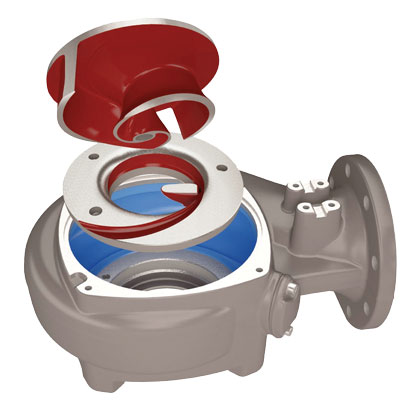Lisa Riles is the marketing and business development manager for the municipal transport market for Flygt, a Xylem brand. In her position, she is responsible for a wide array of pumping equipment and pumping solutions for municipal applications. She sat down with Modern Pumping Today to discuss the growing challenges that municipalities are facing and how new technologies can provide a solution.
Modern Pumping Today: What are the top issues you hear from your customers in the municipal wastewater market?
Lisa Riles: With municipalities’ budgets being tight and many times having fewer maintenance people to deal with problems when they do occur, efficiency and reduced downtime are critical. When they are trying to cut costs, energy efficiency is the number one issue. When it comes to pumping equipment, clogging caused by “modern trash” or “ragging” with disposable products is a major concern for municipalities. Because they have plants and lift stations that have pumps that are clogging, then that requires them to send people out to de-clog them. They have constituents, people who live in the area who don’t want to deal with the smell—it’s a nuisance. Plus it costs money to complete the de-clogging work, meaning their rates will probably go up.
MPT: Has this become a growing concern for municipalities?
Lisa Riles: We know it’s an issue. Turn on your local newscast or review any industry statistics, and you’ll see that the problem is getting worse and worse. Many municipal systems were designed and installed to meet completely different demands than the ones they find in their communities today. It’s required new ideas and new approaches. We as a pump manufacturer have taken on the challenge of finding a solution for it.
For one thing, the popularity of disposable—which many people mistakenly assume as flushable—types of cleaning products in the market including baby wipes, antibacterial wipes, floormop covers is on the rise. This is a growing segment of the consumer market and the wastewater industry has had to come up with an answer for it.

Flygt N technology’s impeller at the backswept leading edge passes today’s “modern trash.”
MPT: What solution can Flygt offer to the problem?
Lisa Riles: We offer a unique solution—Flygt N technology—that incorporates impellers with a backswept leading edge that reduce clogs and are actually able to pass those types of disposable products—the wipes and mop cloths that lead to ragging and clogs—and maintain sustained high efficiency. Traditional wastewater pumps, whether using a single-vane or two-vane channel impeller, allow for rags to collect on the blunt leading edges where they add on and add on. With each cycle of the impeller, the ragging increases until it clogs the impeller. Flygt N technology directly addresses that problem because the hydraulic design of the impeller directs the rags through and doesn’t allow an opportunity for this material to collect and then clog.
MPT: This is different than a conventional pump.
Lisa Riles: It sounds obvious, but one of the differences between clean water and wastewater is that clean water is just that—clean. Therefore, a pump for clean water can have a hydra design with smaller clearances yet maintain good efficiency without concern of solids passing through causing clogs or other problems. With wastewater pumps, however, there’s always a balancing act between designing a pump that can pass solids but also achieve sustainable efficiency. Traditionally, the approach was that you sacrifice efficiency in order to pass the solid, but the Flygt N technology offers a solution with the same efficiency while still being able to pass solids.
MPT: Is Flygt N technology the solution for all municipal markets?
Lisa Riles: That’s only one piece of the puzzle. We have the technology with the pump to handle clogging and to complement the pump we also have solutions for monitoring and control called SmartRun, which is part of our Flygt Experior solutions. It incorporates algorithms within the control that are designed specifically for wastewater—functions like pipe scouring and sump cleaning in a lift station to keep it cleaner and ensure the pumps are working properly and are not going to clog or have other issues.
We also offer an Energy Minimize function where, every time the pump comes on, the VFD is actually looking for how well the pump did last time. For example, if it’s a 60 Hertz pump it can reduce the speed until it finds that optimal point where that pump will minimize its energy usage. These are just some of the things we’re working on to save users on both energy use and maintenance costs.
MPT: Flygt will have a large presence at the upcoming WEFTEC event in New Orleans, but how else are you spreading the news to your customers?
Lisa Riles: One way we’re trying to go out and see customers is that Flygt is travelling the country in our Flygt Trailers. Inside the trailers, we have our newest products and we’re talking to installers and engineers—both offering both training and product demonstrations. We’re always going to have a presence at the traditional trade shows, but we understand that not all of our customers can make it so we’re hitting the road to meet with them. They can see the displays and the solutions right there where they live. ■
_________________________________________________________________________
MODERN PUMPING TODAY, December 2013
Did you enjoy this article?
Subscribe to the FREE Digital Edition of Modern Pumping Today Magazine!
![]()


